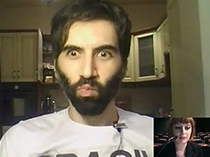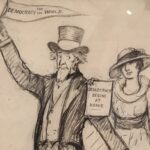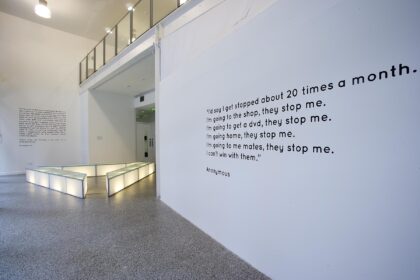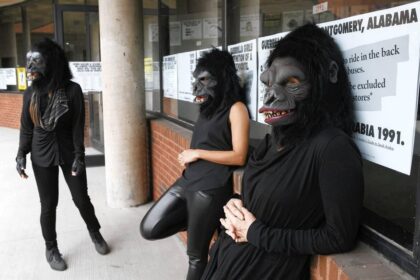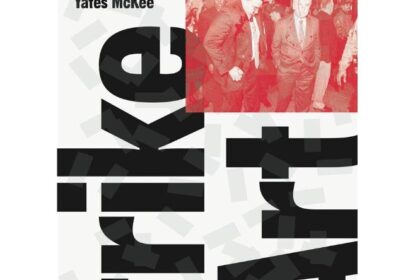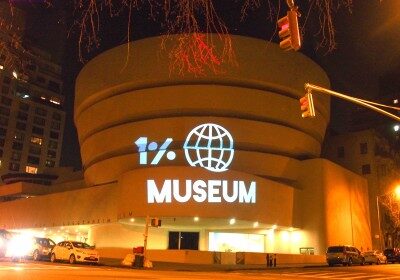Tightrope Routines: A Feminist Artist Interviews The Internet’s Most Infamous Misogynist
Angela Washko
I originally wanted to publish this text a year ago. But I didn’t. I couldn’t. Maybe after you read it, you’ll understand why.
Tightrope Routines is an ongoing and frequently updated storytelling performance based on more than a year of exchanges between feminist artist Angela Washko (me) and pick-up artist, author, blogger and notorious manosphere leader Roosh V. The performance outlines the process from creating a platform to present parallel narratives to Roosh V’s conquest stories by interviewing women who have had sexual exchanges with him, to interviewing the international “love tourist” himself, to becoming a subject of the work myself, to ultimately reassessing the original plan for the project. Initially operating within the vein of tactical media, socially engaged art and artistic activism – the performance presents the story of an artist’s shift from goal-oriented activism to a more complicated and embodied ethnography of an online community extremely hostile toward and easily mobilized against women who self-identify as feminists. If feminists hope for feminism to have any relevancy in American publics broader than the art world, Tumblr and academia, they must adopt a model which is both empathetic to even the perspectives they disagree with and emblematic of the futures they aspire toward.
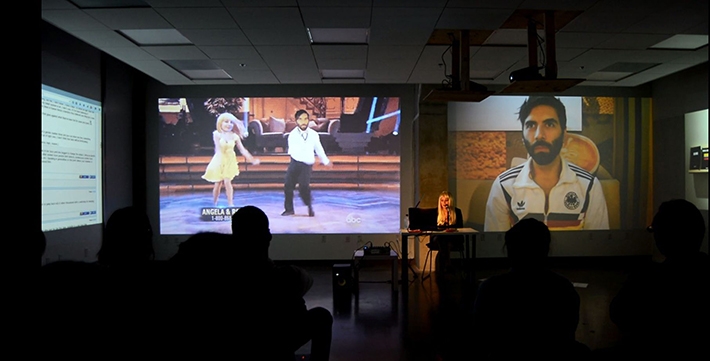
A Danish person has no idea what it feels like to not have medical care or free access to university education. They have no fear of becoming homeless or permanently jobless. The government’s soothing hand will catch everyone as they fall. To an American like myself, brainwashed to believe that you need to earn things like basic health care or education by working your ass off, it was quite a shock…
As I read through Don’t Bang Denmark myself I became increasingly interested in Roosh’s rationalizations – particularly his assessment that the safety net produced by his approximation of the Danish welfare system breeds a culture of women who are not seeking their value from physical appearance or the approval of men. On page 20 he states: “Denmark takes top prize for having the most unfeminine and androgynous robotic women [he’s] met in the world.”[2] On the previous page he arrives at the conclusion that the Danish women he wrote about in his book Don’t Bang Denmark don’t rely on men the same way that women do in other countries where he has practiced his methodologies “because the government will take care of her and her cats, whether she is successful at dating or not.”[2]
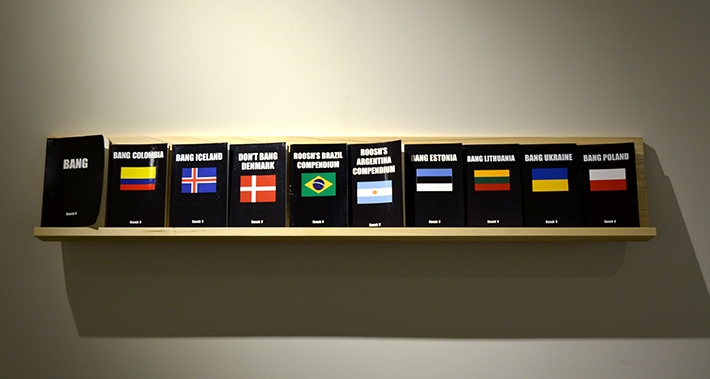
This desire to present the perspectives of the unrepresented and implicitly silenced came initially out of my propensity for feminist activism as well as research I was doing for another project around the construction of “the real” in reality television. In Paul Mason’s essay “The Thin Blurred Line: Reality Television and Policing,” Mason discusses the construction of law enforcement reality television shows which take the perspective of police officers – never giving any context for the arrests they are making, placing the viewer in the position of passenger in the cop car – creating a sense of familiarity and collaboration with the officer, and always making sure that the overarching narrative paints a portrait of law enforcement as inherently good and unquestionably making the right decisions.[5] The 27-season-running reality television show COPS is particularly well documented in this strategy. The officers on COPS are often shown exhibiting a great deal of violence against perpetrators before fully surveying the scene they are called to and the narrative of the show reinforces that however they end up deciding to act, they ultimately made the “right call.”[6] Giving those who had been accounted for in Roosh V’s erotic tales a space to make alternative perspectives visible was an activist impulse, a gesture of resistance toward a contemporary media climate which seeks to present a black and white “objective viewpoint” on matters which are incapable of being objective (as we understand objectivity now). The impulse also stemmed from a desire to break down his performance of absolute certainty on the Internet and challenge the myth of objectivity that much of his community clings to, destabilizing his carefully crafted narratives by introducing other complicating voices. Roosh’s framing of the women he has sex with using his methodologies makes it clear that he believes he is manipulating them to some degree with his game[7], however I imagined that their experiences are much more complex, autonomous and interesting than the one-sided stories of conquering victims armed with biological determinism, “logic and reason” presented in Roosh’s blogs, books and forum posts suggest.[8] Most of Roosh and his community’s rhetoric is saturated with the idea that those who have taken the red pill (“alpha male” participants in the manosphere) are living rational, scientific, logical and objective lives while those who have taken the blue pill (“beta males,” feminists, “cultural Marxists” and “social justice warriors”) live in a selfish and delusional fantasy world. In his recent essay outlining these worldview distinctions, “What is Neomasculinity?,” Roosh V writes:
While “red pill” has many definitions, it’s consistently used as a way or means to view the world in an objective, truthful, and factual manner, no matter how inconvenient or painful. It may seem redundant to need a method of seeking truth of the world, since it should be a default technique for all educated persons in a society, but identity politics and special interests deliberately conceal and distort truths to further utopian ideals or to consolidate their own selfish need for power. For example, today’s left-leaning establishment deliberately conceals differences in sex and race in order to promote an ideal of equality that is meant to severely handicap men.[9]
Furthermore, Roosh V’s Community Beliefs section of his blog outlines seven indisputable rules for participation in his sphere:[8]
- Men and women are genetically different, both physically and mentally. Sex roles evolved in all mammals. Humans are not exempt.
- Men will opt out of monogamy and reproduction if there are no incentives to engage in them.
- Past traditions and rituals that evolved alongside humanity served a net benefit to the family unit.
- Testosterone is the biological cause for masculinity. Environmental changes that reduce the hormone’s concentration in men will cause them to be weaker and more feminine.
- A woman’s value significantly depends on her fertility and beauty. A man’s value significantly depends on his resources, intellect, and character.
- Elimination of traditional sex roles and the promotion of unlimited mating choice in women unleashes their promiscuity and other negative behaviors that block family formation.
- Socialism, feminism, cultural Marxism, and social justice warriorism aim to destroy the family unit, decrease the fertility rate, and impoverish the state through large welfare entitlements.
My initial proposal to interview women who had sexual encounters with Roosh V to ultimately produce a web-based compilation of alternatives to Roosh’s stories would be completely unattainable without massive, global distribution of a call for these women. I called this phase of the project BANGED and submitted a proposal to Rhizome at the New Museum’s Internet Art Microgrant competition, hoping that in the event it were to be awarded the grant, it would help propel mainstream media interest in the work and create leverage for opportunities to distribute my call more broadly. This strategic distribution process was influenced by many tactical media artists and artworks, but most notably Igor Vamos’ 1993 project Barbie Liberation Organization which involved the manipulation of national print and TV news sources to spread the rumor that hundreds of Barbie and G.I. Joe dolls had had their voice boxes switched in a radical intervention on the marketing of traditional gender roles to children.[10] Like the BLO, my project needed to sound radical enough to be similarly distributed via mainstream news. BANGED was ultimately awarded one of five Rhizome Internet Art Microgrants, and this did indeed begin a modest chain of media attention around it. The unanticipated side effect of the strategically instituted broader visibility of the project was the inevitability of Roosh’s awareness of it.
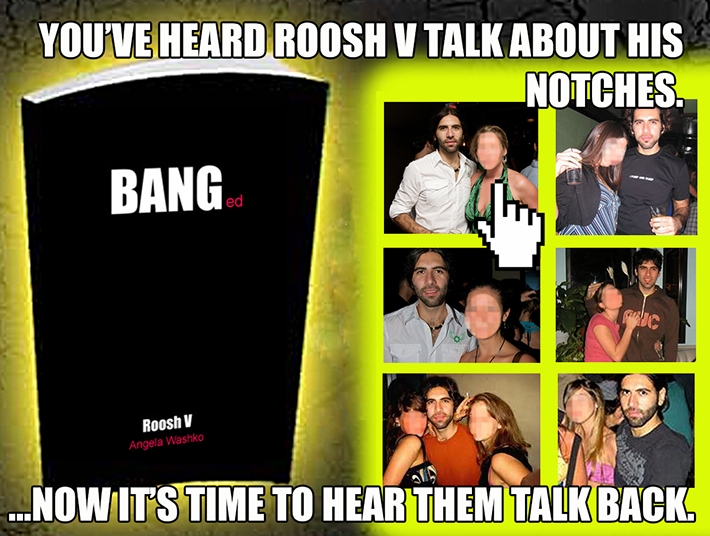
This approach developed out of an ongoing project I’d been working on inside World of Warcraft concurrently. In 2012 I founded The Council on Gender Sensitivity and Behavioral Awareness in World of Warcraft, a performative intervention inside the most popular massively multiplayer online role playing game of all time.[7] I started the project as a platform to discuss issues within the community’s public communication channels which had been quite misogynic, homophobic and racist on the servers I had been playing on. As The Council, I facilitate conversations about inclusivity, entitlement, who gets to ask questions about the community’s actions, how players are held accountable for harassment and other forms of online abuse, why women are treated so poorly in the space, and why the politics of everyday life end up so embedded in exchanges in the fantasy game landscape. With as many as 10 million subscribers accessing WoW, the project also served as an opportunity to poll a diverse, geographically disparate population (much broader than I have access to within my on-and-offline art communities and physical proximity) about public opinion regarding women’s roles in contemporary American culture and feminism. This practice of participating in a dialogue about the conditions of a space in the space itself and providing platforms for empathy toward a variety of subjectivities that I may or may not agree with also became a way to show to a large community that the public connotation of what a feminist is – is horribly one-dimensional (many discussion participants have admitted to never communicating with feminists before our talks). Both of these projects also at their core address a larger impulse toward facilitating conversations across increasingly disparate online spheres. How can we as artists be in conversation with those who are not already inclined to agree with us? This question is not a new one.
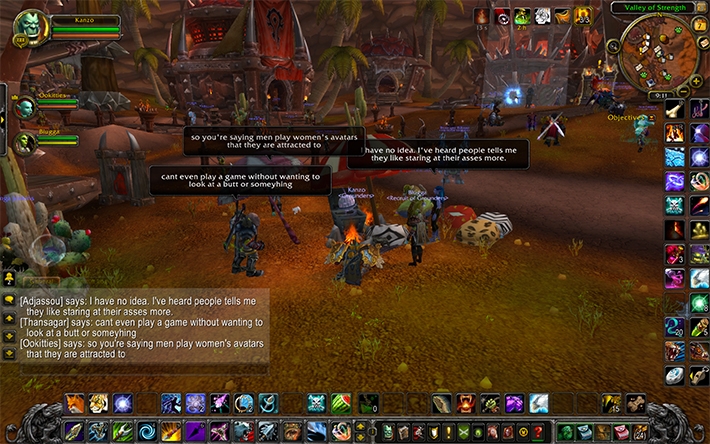
Thirty years later, how can we harness collaborative culture, critical analysis, participatory technologies, and aesthetics to incite social change? What content and platforms can we create that respond to the limits and possibilities of the ever-shifting contemporary media landscape?[13]
Artists interested in continuing the tactical legacy of these artists must look at how media is disseminated now and consider those sources as territories to intervene on: YouTube, online video games, social media platforms, news websites, Netflix, reality television etc. As media sources shift, artists and activists who hope to engage with their issues and audiences must adapt and shift with them—studying, critiquing and creating alternatives. That’s where I come in, tumbling headfirst into a manosphere rabbit hole.
Thinking about these questions regarding what constitutes media activism today, I proceeded to reach out to Roosh V to request an interview with him for BANGED. After reading the discouraging disclaimer on his website regarding his complete lack of interest in responding to emails from women,[14] I took great efforts to neutralize my position and to construct a sensible argument for its benefits to him. Roosh is quite sensitive to how he has been portrayed by the media and prefers to self-publish, maintaining control over the way that his statements are edited.[15] Keeping this in mind, I sent him the following email:
Hey Roosh,
I know you saw my project (which got the grant btw) online. I also know you probably have no interest in talking with me – but to keep this as brief as possible:
- I’m not looking to make a project about how you’re a shitty anti feminist. Every feminist media person has already done that. And it’s simple and boring.
- I am legitimately interested in your books, methods, and the women you bang. This is why I am trying to find them + talk to them. You could help me by connecting me to them – but this seems highly unlikely.
- If you look at my actual projects (and not what’s written about them by press from Vice, Dazed, Neural, The Guardian etc.), you’d notice that I tend to take a neutral stance when discussing these (gender) issues with my interviewees. Especially with The Council on Gender Sensitivity and Behavioral Awareness in World of Warcraft.
- I am actually interested in creating a more nuanced discussion of why feminism is such a polarizing topic and why it needs to change in order to have any relevance in American public life.
So with all that said – I would love to interview you as part of my BANGED project. I understand if you’re not interested + you’re busy + my project from it’s harsh phrasing sounds like it’s out to condemn you or something. But tbh it’s not. Like I said, plenty of ppl have already done that. Lemme know if you would be up for doing an interview via email or on skype. I’ve attached a face and body photo as per your guidelines for women who want to email you.
Best,
Angela

When staging an intervention it has always been important for me to gain access by learning and following protocols of spaces first before subverting them – so I additionally attached a full body and face photo as per the rules for female correspondence clearly stated in the Frequently Asked Questions section of his bio on his blog.[14] Roosh responded right away, asking what the benefit would be for him. I offered him the entirety of my grant money from Rhizome as well as the opportunity to be exhibited in museum and gallery contexts through the interview, suggesting that this would consequently increase his potential for cultural capital bangs. The money did not interest him, but the prospect of art world fame and sex propelled by cultural capital did. After over a month of emailing him a question or two every day or so (a format of engagement which he requested), I was finally able to convince him to do a digitally mediated interview over Skype. The full interview and the text transcript is available to view here: http://animalnewyork.com/2015/monopoly-logic-feminist-artist-interviews-internets-infamous-misogynist/
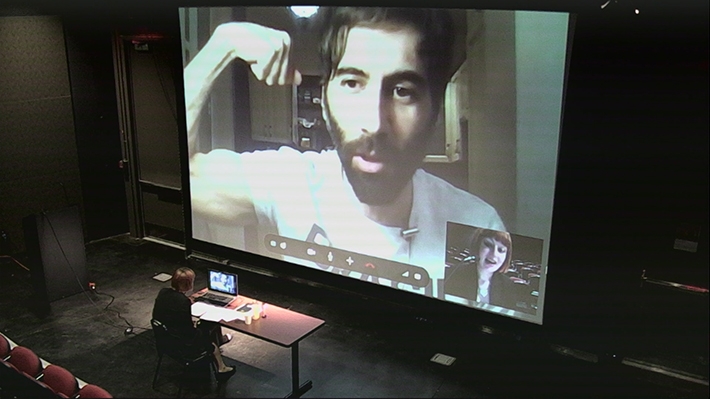
[Roosh]: No, no, no. I’m not getting this from the news! I’m not getting this from the news. I’m getting this from careful thinking from available science that is proven to be right. That’s it. I mean, the thing is, to be on the left now there are so many contradictions they think of that I can only think of the mental gymnastics that these people have to go through to ignore, like you have been doing, the contradictions. I mean, I’m just saying let’s be consistent. If you’re logically consistent, your belief system is in a lot of problems.
[Angela]: Can you tell me more about your use of logic and science for your arguments? Can you tell me about the logic and science behind sort of your worldview?
[Roosh]: Yeah. I use logic and science.
[Angela]: I mean, but can you elaborate? Because I mean, it’s easy to just say… I mean I could sit here and say ‘I know science! Science! Science! Science!’
[Roosh]: Ok. Ok. Sure. The only thing is this: I believe that the only way to really use logic is to ignore the feelings that you have for one outcome or the other. If you have an emotional investment into a lifestyle and to a way of life that you’ve been taught for four years in school, getting a contradictory piece of information will cause your brain to either accept or reject. And what people do to accept something that goes against what they’ve learned for a long time, it’s really hard because that means for thousands of days they believed in the wrong thing. But me, I don’t know. I have a filter. I’d rather be right than feel good. I don’t need to feel good. I don’t need to feel warm and fuzzy on the inside that my belief system is ok. I don’t care. If I’ve been believing in something wrong for 35 years and new evidence tells me that, so be it. You know, many times in human history scientists they believed one thing but a new experiment has shown: holy shit we were wrong. But people nowadays, they go crazy if you show them a fact that goes against what they’ve been fed for years and years. So that’s all.
[Angela]: So you’re not emotionally invested in the arguments that you’re making?
[Roosh]: No.
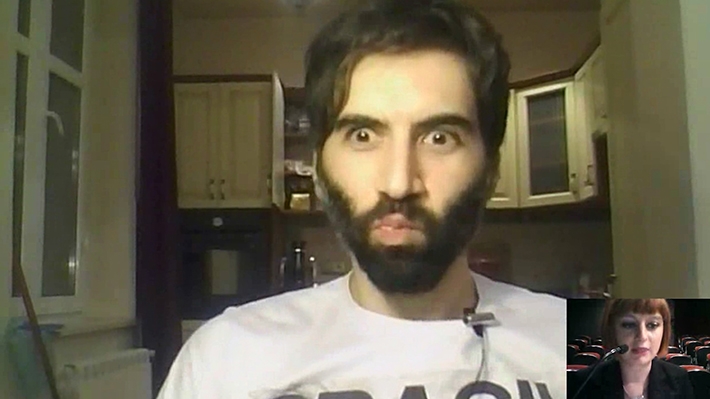
I am arguing for politics and epistemologies of location, positioning, and situating, where partiality and not universality is the condition of being heard to make rational knowledge claims… There is no single feminist standpoint because our maps require too many dimensions for that metaphor to ground our visions. But from the feminist standpoint, theorists’ goal of an epistemology and politics of engaged, accountable positioning remains eminently potent. The goal is better accounts of the world, that is, “science.” Above all, rational knowledge does not pretend to disengagement: to be from everywhere and so nowhere, to be free from interpretation, from being represented, to be fully self-contained or fully formalizable. Rational knowledge is a process of ongoing critical interpretation among “fields” of interpreters and decoders. Rational knowledge is power-sensitive conversation.[16]
Despite challenging Roosh in the interview with regards to his lack of acknowledgement of his subjective position, his deeply held belief that his perspective is objectively accurate has translated into placing himself in the authoritative position to distribute these supposedly rational, logical, scientific truths that women are inherently intellectually inferior and bound by their biological build to care for the pursuits of men and the development of children. Though mostly polite and extremely generous with his time throughout our interview, Roosh appeared convinced that due to my biological birth assignment (woman), I was unable to think autonomously and absolutely could not be well-regarded in my field, so much so that his community is still certain that the GIFs I produced for this project were made by a man.[17] It was clear that Roosh (and subsequently his community) perceived me as existing in a bubble removed from most of society. Consistent with his outspoken views on feminists, he assumed that I was a naive, inexperienced, and easily-led person who let some feminist propaganda I picked up in undergraduate school and on Buzzfeed shape my worldview, as opposed to experience and my own research. Ultimately, our roles reflected Roosh’s defensive engagement with the world at large – everything from my hair (too short) to my taste in men (too feminine) to my education (too much of it) was up for criticism even though the interview was intended to highlight his work, how he ended up in his field and how he ended up framing his experiences the way he has. During the interview, Roosh responds to my question regarding his objective authority:
[Angela]: This is another question that I was planning to ask and it’s a very huge question, but how can anybody claim to have an objective reality? I mean your reality is obviously constructed from the many different places that you’ve lived and the experiences that you’ve had and the people that you’ve met and all of these things. Obviously somebody who has only lived, like most of my family has lived, in one town in Pennsylvania for most of their lives – their sort of reality is constructed very differently. But can’t you say that yours is also constructed based on your experiences?
[Roosh]: But it is more objective than 99.9% of the people who hate on me. I have seen and done more. I have read more. I have been exposed to more. I have been exposed to different ideas, belief systems than other people. I’m not saying I’m smarter. I’m not. I’ve just seen it all, done it all, read it all. I have more data and background in my mind that allows me to reach conclusions are more accurate. No, I’m serious!
[Angela]: Are you saying feminists don’t travel?!
[Roosh]: They… Where do they go? They go to France, Spain, England, Ireland, the Caribbean.
[Angela]: We may be more diverse than you imagine!
[Roosh]: They go for a short time. You know, do they learn the language? Do they really interact with the locals for years and years? If they do, I would like to meet that girl because I would have a lot in common with her.
*Angela laughs and waves*
[Roosh]: Ok. But you know one thing is that people in the U.S., they think they go to a college and they graduate and they’re qualified. They think they’re qualified to talk about the problems facing cultures. They’re not. They’re just kids! So you have a bunch of kids holding their signs ‘consent this’ and ‘consent that.’ They’re just kids who think they are smart and think they understand how the world is. But they don’t because they haven’t even lived yet. And they’re not old like me… and they’re not experienced.
After the interview was distributed initially via mainstream news website ANIMAL New York, this seemingly Sisyphean attempt to create a conversation across disparate online echo chambers and to create a more complex image of what a feminist might be like in mainstream media actually initially appeared to be working. By default, many members of Roosh’s community were quick to dismiss me as a “feminist bitch” and a “whore on a herd mission,” but a number of other comments from his community indicated that there was an appreciation of my process and commitment to presenting the interview unedited in its entirety.[18] Roosh V Forum member “dads” stated in the currently 272 post forum topic titled “Roosh V Interviewed by a Feminist”:
I’m going to give this woman a lot of credit because she put up the video of the interview and the transcript, and let it speak for itself, outside of a few editorials at the beginning. Hey, she said herself “I’m into bridging separate echo chambers,” and that’s the most positive step I’ve seen in a long time, outside of these “WINS FOR THE MANOSPHERE” and “WINS FOR FEMINISTS” that seem to dominate the conversation.[19]
Many forum members initially concluded in agreement with this statement from Roosh V Forum participant “ChrisPitts”: “despite both Roosh and Angela being on opposite ends of the spectrum, you were at least able to have a civilized conversation with each other.”[20] This in itself felt like a pretty significant achievement from a community who produce and support Roosh’s neomasculinity focused blog Return of Kings, well known for its militantly anti-feminist articles like “The 9 Ugliest Feminists in America,” “How to Defeat Feminism” and “The Anti-Feminism Wisdom of the Bible.”[21] Roosh also confirmed in both personal email and over Twitter that he was happy with the interview and did not feel exploited by the process. However, the interview with Roosh was never meant to be the entirety of the project. As I mentioned to Roosh in my interview with him, I still intended to find women who had been on the receiving end of his seduction tactics. Roosh was not willing to introduce me to these women but was at this point amused by the project
[Angela]: And you’re not going to connect me to anyone that has had sex with you, are you?
[Roosh]: I mean that’s kind of –
[Angela]: It might give you more favorable reviews!
[Roosh]: Ok listen. Listen. I could see girls in the U.S. being like ‘Oh that’s cool!’ but Eastern Europe is very different. That’s where I’ve been for like three years. And girls here… to have some girl from the U.S. saying she’s doing an art project on this guy… I don’t know. I don’t know.
[Angela]: I mean, I’ve lived in Finland and in Denmark – so I will be asking there. I know that you didn’t have such a great time in Denmark, so maybe I’ll be getting a lot of people responding in Denmark. I don’t know.
[Roosh]: See ok. The U.S. is like the only place where girls don’t mind to kiss and tell. They just don’t care. But in Eastern Europe they don’t really do that and I don’t want to put a girl on the spot by sharing these intimate details of what we did. So unfortunately I don’t think I can help you out there, sorry.
[Angela]: That’s fair. No, I didn’t assume that you would. You were pretty generous with your response.
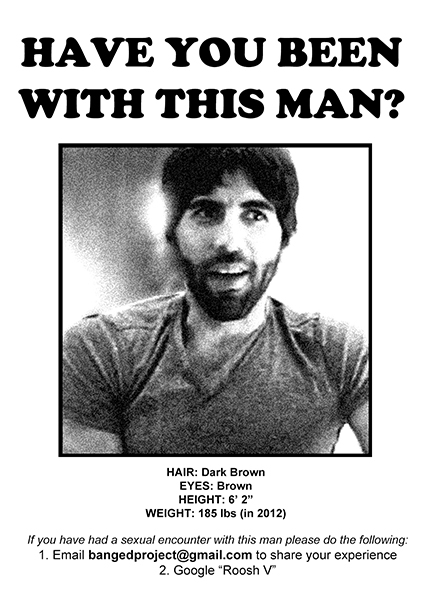
Roosh never anticipated that I would be in a position to distribute my call for women widely enough for anyone in the areas he had most frequently practiced his craft (i.e. Washington DC, South America or Eastern Europe) to get wind of my project and come forward for an interview. In addition to incorporating more complicated points of view and symbolically providing a platform for potentially conflicting and nuanced perspectives, the interview itself became quite effective as leverage for distributing my calls for women on the receiving end of Roosh’s conquest methodologies. Many mainstream news publications and individuals with large audiences began to write about the project and my call traveled widely, ending up on websites like The Hairpin, Jezebel, The New Republic, Hyperallergic and more. It was at this point that sentiments toward me within Roosh’s community shifted. I did not anticipate that I would be subjected to the aggressive scrutiny of Roosh’s community as part of my investigation. I had forgotten my own position in the work and while digging into the personal life of this seemingly public figure, it became apparent to me that although he describes himself as “infamous worldwide”[22] – this identification is part of a façade that he has constructed, supported by an accumulation of committed men similarly disenfranchised by the progressive interests of contemporary women. My project’s departure point to interview women he’d had exchanges with was not originally meant to happen in conversation with Roosh himself. Due to his self-aggrandized and ultimately self-fulfilling public figure status, it did not initially occur to me that he would engage with me or my project. As the project got more attention, Roosh and his community began to frame my project as obsessive and called me a stalker who was desperately trying to have sex with Roosh. After I was interviewed by The Hairpin to distribute the call, Roosh began to defensively address my project over Twitter. An early conversation proceeded like this:
[@rooshv]: Remember that feminist who interviewed me? I’m getting concerned with her fixation on me http://thehairpin.com/2015/02/the-battle-of-the-sexes-an-interview-with-angela-washko/.
[@thesledgetobias]: @rooshv @angelawashko The only way for her to truly experience the essence of Roosh is to be seduced by him and make love to him a few times
[@JohnFlynt]: @thesledgetobias @angelawashko @rooshv Too risky. She might get him to fuck her and then call the police and say he raped her.
[@thesledgetobias]: @angelawashko @rooshv That is a good point. It’s quite a risk to put any trust in a feminist.
[@rooshv]: @thesledgetobias Sleeping with a girl like @angelawashko would require a consent form with a witness signature.
[@DeePeeTaco]: @angelawashko I live near you. We should do lunch and talk about @rooshv. His writing has helped improve my quality of life significantly.
[@rooshv]: @DeePeeTaco @angelawashko Sly dog trying to steal my groupie.
[@DeePeeTaco]: @rooshv @angelawashko woah I’m not putting out until her hair is longer than mine. Until then, me and her can just be friends.[23]
The conversation continued throughout the Roosh V Forum. The most interesting part of the thread is perhaps the members’ discussion of my intentions. Was I being sincere? Was I trying to exploit Roosh’s infamy for my own career goals? Was I qualified to call myself an artist? Was I trolling Roosh for fun and feminist misandry? Was I just obsessed with Roosh and had orchestrated this as an attention-seeking stunt to facilitate my own sexual encounter with him? Many responses echoed Forum member Lizard King’s suggestion “she should cut to the chase and let Roosh bang her for her ‘art’.”[24] Though forum member AnonymousBosch countered “If you can pop a chub for a masculine, short-haired woman with an annoying voice like that, you’re a stronger player than I am.”[25] In a later post, AnonymousBosch suggested a movement to mobilize the Roosh V Forum toward digging up my personal information, stating: “Don’t underestimate her… I’d strongly-suggest the fire team start investigating her background, the way she is investigating Roosh’s girlfriends – she’s set the bar at that level. It might uncover something interesting.”[26]
I don’t know why I didn’t anticipate this type of response. As I became a subject of my own project to the largest audience of the work (Roosh V’s manosphere) – my email inbox, social media accounts, website, comment sections of articles I’d written or been interviewed for, and online forums were flooded with criticisms, questions, threats and insults at my personal appearance, intentions and mental stability. I felt silenced publicly as my socially engaged tactical media experiment spiraled and backfired into my face. The more I thought about it, the more I empathized with Roosh’s position. Who was I to attempt to unearth the details of his personal sexual exchanges, regardless of whether or not it was an elaborate mythology or a dedicated practice of deception (or most likely something in-between)? My activist intentions which appealed to many (including the public voters who secured my place as a finalist for the Rhizome Internet Art Microgrant[27]) were not appropriate for this terrain and not true to my own approaches and aspirations for my practice. The one-dimensionality of my proposal to create a platform for the underrepresented voices in Roosh’s narratives (the “banged”) runs counter to my practice of operating within digitally mediated social spheres and expanding upon the complexity of otherwise seemingly black and white topics. As I began doubting my own initial impulse to publish the accounts of women who have had exchanges with the manosphere leader formerly known as Daryush Valizadeh, I also started feeling concerned for the safety of the handful of women who started to come forward to be interviewed. If I were to publish their accounts, undoubtedly despite my promises of anonymity – Roosh would know who they were and they would be outed and harassed by his community. Having been on the receiving end of that attention, I felt uncomfortable subjecting anyone else to it. Additionally, his community had begun to discuss my project as though it was slander and suggested that Roosh V sue me for libel.[28]
Throughout the project I’d been reading the book I Love Dick by Chris Kraus. The novel diaristically chronicles Kraus’ practice of compulsively writing letters to her one-sided love interest Dick, blurring the line between fictional storytelling and first person documentary. In this process, Dick becomes a somewhat fixed character for Kraus to project her imagination of their collaboration and relationship onto. However, Dick is having a completely different relationship to her behavior – revealing at the end how disturbed he is by Kraus’ project and fixation on him. In Kraus’ account, Dick ultimately ends the willfully delusional exchange by sending a letter to her ex-husband, along with a Xeroxed copy for her as well. On page 260 of I Love Dick, the part of Dick’s letter which struck me in relation to my own shifts in thinking about BANGED:
In retrospect I feel I should have been absolutely unambiguous in my response to the letters you and Kris sent over the following months instead of opting for bemused silence. I can only say that being taken as the object of such obsessive attention on the basis of two genial but not particularly intimate or remarkable meetings spread out over a period of years was, indeed still is, utterly incomprehensible to me. I found the situation initially perplexing, then disturbing and my major regret now is that I didn’t find the courage at the time to communicate to you and Kris how uncomfortable I felt being the unwitting object of… some bizarre game. I still have immense respect for your work… I can only reiterate what I have said before: that I do not share your conviction that my right to privacy has to be sacrificed for the sake of that talent.[29]
Although Roosh is certainly not the charming British media theorist and sociologist that Kraus’ Dick was, I started to understand why Roosh might reframe (or intentionally misconstrue) my project as borne out of the obsessions of a disturbed stalker. His public explanation of my project was coming from a place of concern regarding the maintenance of his legacy within his community and the discomfort at being examined in such a probing manner – a manner in which anyone might feel uncomfortable. When he did see the call distributed somewhat widely and the possibility that I might gain access to some of the women he’s had relationships with, he reacted quite publicly and defensively. By framing me as crazy or obsessive or stalker-like, he attempted to discredit any potential future interviews with women who might come forward. After this analysis, I became caught between wanting to be respectful of someone I had been trying to empathetically understand and interview fairly by creating a scenario in which we had a conversation across polarized positions and online communities (digifeminists and manosphere participants), however at the same time, I still sought some form of justice—some form of visibility—for those who are accounted for as receptacles for Roosh’s actions but never given a voice.
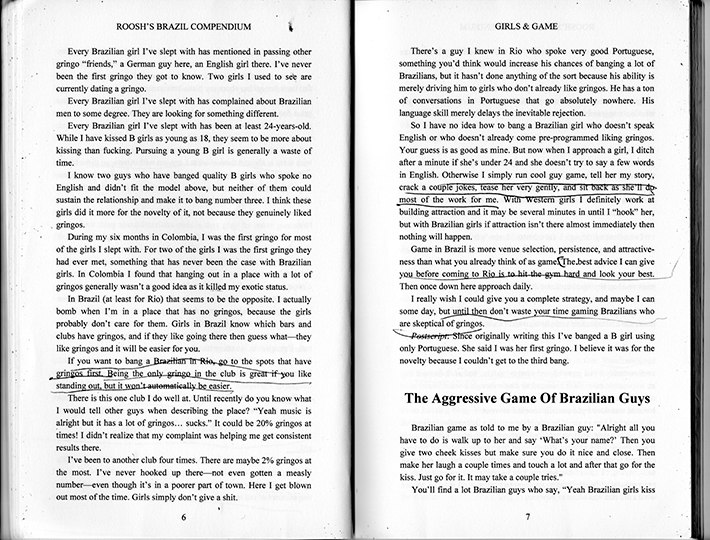
Tightrope Routines is a storytelling performance about admitting that my initial project was misguided despite art world validation stating otherwise and the importance of reassessing activist impulses, regardless of how righteous they may seem. As an artist and feminist prying into the private life of someone already publicly diagnosed as a psychopath,[30] despite how mediagenic and “feel-good” my idea to solicit testimonials from women who had been accounted for in Roosh V’s conquest narratives – a situated feminist engagement with this matter should not employ the same lack of empathy of that of its oppressors. Tightrope Routines is a performance about the necessity to recalibrate approaches and expectations when operating in the social and the process of embracing complexity over a clear, well-packaged deliverable in a grant-driven research-based art context. Tightrope Routines is a story about knowing when to step back and maintain space for privacy despite an inclination toward radical transparency (which is of course another mythology). The performance embraces the fact that the conditions of the field are more complicated than one tactical media artist’s aggressive approach to interacting with it (which was the least interesting, but most popular aspect of a much longer story about two far flung human-scale snow globes, an olive branch [or a trap] extended between them, and an artist stuck outside burrowing deeper and deeper into a rabbit hole).
Angela Washko is an artist, writer and organizer devoted to creating new forums for discussions of feminism in the spaces most hostile toward it. She is a Visiting Assistant Professor at Carnegie Mellon University. In 2012, Washko founded The Council on Gender Sensitivity and Behavioral Awareness in World of Warcraft as an ongoing intervention inside the most popular MMORPG of all time. In winter of 2017 at Carnegie Mellon University’s Miller Gallery she will curate HACKING / MODDING / REMIXING as feminist protest, a survey exhibition of women working at the intersection of art and technology intervening on dominant voices in technology and popular culture, producing critical works from the last 30 years that give visibility to women’s perspectives and experiences that have been marginalized, ignored, or dismissed.
A recipient of a Franklin Furnace Performance Fund Grant, a Creative Time Report commission, and a Rhizome Internet Art Microgrant, Washko’s practice has been highlighted in Art in America, Frieze Magazine, Time Magazine, The Guardian (UK), ArtForum, ARTnews, VICE, Hyperallergic, Rhizome, the New York Times, The Creator’s Project, Art Monthly, Neural and more. Her projects have been presented nationally and internationally at venues including the Milan Design Trienniale, Kiasma Museum of Contemporary Art (Helsinki, Finland), Los Angeles Museum of Contemporary Art, Moving Image Art Fair (London and NYC), the Rotterdam International Film Festival, and Institute for Contemporary Art Boston. http://angelawashko.com/
Notes
[1] Baker, Katie J.M. “Cockblocked by Redistribution: A Pick-up Artist in Denmark.” Dissent Magazine N.p., Fall 2013. Web 11 Oct 2014. Available online at: <https://www.dissentmagazine.org/article/cockblocked-by-redistribution>
[2] V, Roosh. Don’t Bang Denmark: How To Sleep With Women In Denmark (If You Must). Self-published via CreateSpace, Charleston, 2011.
[3] Books by Roosh V can be viewed at <http://bangguides.com/> and his Amazon.com store <http://www.amazon.com/Roosh-V/e/B00649OS0O>
[4] Roosh V refers to pseudonymous women frequently in his writing (categorized as nonfiction on his website) – here I reference specifically “Anna” and “The British Virgin”. Online at <http://www.rooshv.com/anna> and <http://www.rooshv.com/the-british-virgin> respectively
[5] Mason, Paul. “The Thin Blurred Line: Reality Television and Policing,” The British Society of Criminology Conference: Selected Proceedings, Vol. 5, August 2003.
[6] Kirell, Andrew. “Good Riddance: Fox Cancels Long-Running, Drug War-Glorifying, Abuse-Excusing Reality Series COPS,” Mediaite, 06 May 2013. Web 11 May 2015. Online:<http://www.mediaite.com/tv/good-riddance-fox-cancels-long-running-drug-war-glorifying-abuse-excusing-reality-series-cops/>
[7] Roosh V’s essay “The 9 Immutable Laws of Pick-Up” outlines candid advice on how to improve game and adjust expectations. Online:<http://www.rooshv.com/the-9-immutable-laws-of-pick-up>
[8] Although Roosh V’s about/bio page is updated regularly, at the time of the publishing of this essay it contains a section called “Community Beliefs.” These include a number of highly conservative, traditional family values and biologically deterministic tenets. Numbers 4 through 6 on the seven tenet list include: “4. Testosterone is the biological cause for masculinity. Environmental changes that reduce the hormone’s concentration in men will cause them to be weaker and more feminine. 5. A woman’s value significantly depends on her fertility and beauty. A man’s value significantly depends on his resources, intellect, and character. 6. Elimination of traditional sex roles and the promotion of unlimited mating choice in women unleashes their promiscuity and other negative behaviors that block family formation.” Online here: <http://www.rooshv.com/bio>
[9] “What is Neomasculinity?.” Roosh V Blog. 20 May 2015. <http://www.rooshv.com/what-is-neomasculinity>
[10] In the article referenced below, The New York Times describes the Barbie Liberation Organization project. The news media interventionist strategies Igor Vamos and his BLO employed described in this article influenced my own strategies of working online – particularly with regards to disseminating information about my attempt to track down women who have had sexual exchanges with Roosh V. See: Firestone, David. “When Barbie Talks Tough, G.I. Joe Goes Shopping,” The New York Times, December 31, 1993.
[11] “The End Game of Feminism.” Roosh V Blog. 10 April 2015 <http://www.rooshv.com/the-end-game-of-feminism>
[12] In 2012, Business Inside called World of Warcraft the top grossing game of all time – having made over 10 billion dollars. Douglas, Ana. “Here Are The 10 Highest Grossing Video Games Ever.” Business Insider,13 June 2012. < http://www.businessinsider.com/here-are-the-top-10-highest-grossing-video-games-of-all-time-2012-6?op=1>
[13] “Being the Media: Designing a New Rrradical Media, Day One: Radical Media Then and Now.” Vera List Center for Art and Politics at The New School. 10 Feb 2012, The New School. 10 May 2015 <http://www.veralistcenter.org/engage/event/490/being-the-media-designing-a-new-rrradical-media-day-one-radical-media-then-and-now/>.
[14] In the FAQ section of Roosh V’s website, his response to the statement “I’m a girl. I want to ask you a question” is: “I probably won’t answer your email unless you include a link to your picture (both face and body must be visible). Online: <http://rooshv.com/bio>
[15] Roosh V has written an essay on doing interviews with media members. “How To Do Interviews With The Mainstream Media.” Roosh V Blog. 10 April 2015 <http://www.rooshv.com/how-to-do-interviews-with-the-mainstream-media>
[16] Haraway, Donna. “Situated Knowledges: The Science Question in Feminism and the Privilege of Partial Perspective,” Feminist Studies, Vol. 14 No. 3, Autumn 1988.
[17] In the currently 272-post thread of the Roosh V Forum titled “Roosh Interviewed By A Feminist”, my project is discussed by Roosh’s community. In Post #222, member Zelcorpion seems to believe that a male friend of mine is responsible for creating one of the gifs in the project made from stills of our interview. I created it myself. “Someone of your male friends seems to have compiled a crazy-misogynist gif of Roosh cutting together everything he could to make the person look demented. Compared to many celebrity gifs this looks comparatively tame, but at least somewhat funny.” Direct link to Post #222: <https://www.rooshvforum.com/thread-44181-post-1006747.html#pid1006747>
[18] “Roosh Interviewed By A Feminist.” Roosh V Forum. 10 April 2015. <http://www.rooshvforum.com/thread-44181.html>
[19] In Post #11 of the Roosh V Forum thread titled “Roosh Interviewed By A Feminist”, forum member dads wrote: “I’m going to give this woman a lot of credit because she put up the video of the interview and the transcript, and let it speak for itself, outside of a few editorials at the beginning. Hey, she said herself “I’m into bridging separate echo chambers”, and that’s the most positive step I’ve seen in a long time, outside of these “WINS FOR THE MANOSPHERE” and “WINS FOR FEMINISTS” that seem to dominate the conversation.” Direct link to Post #11: <https://www.rooshvforum.com/thread-44181-post-930912.html#pid930912>
[20] ] In Post #28 of the Roosh V Forum thread titled “Roosh Interviewed By A Feminist”, forum member ChrisPitts wrote: “I thought it was a good interview. Roosh articulated a lot of our positions very well and I think she was surprised to see the depth and intelligence in your answers. Despite both Roosh and Angela being on opposite ends of the spectrum, you were at least able to have a civilized conversation with each (or at least so it seemed, since I only read the transcript). Funnily enough, it’s Kyle, the Beta Boy Wonder, with the dumbass comment at the end to satisfy his feminist overlords.
I’m willing to bet Kyle pees sitting down and wears fanny packs.” The reference to Kyle is in regards to comments he made as camera operator from off camera at the end of the interview. Direct link to Post #28: <https://www.rooshvforum.com/thread-44181-post-930965.html#pid930965>
[21] Valizadeh, Roosh. “The 9 Ugliest Feminists in America.” Return of Kings, 15 January 2013.<http://www.returnofkings.com/2099/the-9-ugliest-american-feminists>
[22] In the bio section of his website, Roosh V writes about his demonization by the media. He states: “I didn’t try to become infamous worldwide, but that has been the outcome, all because of my teachings and ideas. I’ve been falsely accused of crimes like rape and harassment by my enemies in an attempt to shut me down, but they are too weak to defeat me.” <http://rooshv.com/bio>
[23] V, Roosh. [@rooshv]. (2015, February 3). Remember that feminist who interviewed me? I’m getting concerned with her fixation on me <http://thehairpin.com/2015/02/the-battle-of-the-sexes-an-interview-with-angela-washko/> [Tweet]. Retrieved from <https://twitter.com/rooshv/status/562619110002290689?lang=en>
[24] In Post #207 of the Roosh V Forum thread titled “Roosh Interviewed By A Feminist”, forum member Lizard King wrote: “She should cut to the chase and let Roosh bang her for her ‘art’.” Direct link to Post #207: <https://www.rooshvforum.com/thread-44181-post-987290.html#pid987290>
[25] In Post #209 of the Roosh V Forum thread titled “Roosh Interviewed By A Feminist”, forum member AnonymousBosch wrote: “If you can pop a chub for a masculine, short-haired woman with an annoying voice like that, you’re a stronger player than I am.” Direct link to Post #209: <https://www.rooshvforum.com/thread-44181-post-987490.html#pid987490>
[26] In Post #213 of the Roosh V Forum thread titled “Roosh Interviewed By A Feminist”, forum member AnonymousBosch wrote: “I made the list. Feminist logic:
– Attempting to track down a Guy’s ex-girlfriends to interview them for ‘research purposes’ is normal.
– Discussing my (clear lack of traditional) sexual-attractiveness, (let alone artistic ability), is ‘creepy’.
And for all the macho talk of her getting ‘flirty’ and being ‘intimidated’ by Roosh, never forget that this is a Feminist, and all Feminists are seeking the social power they lack due to being Fugly / Obese / Unpleasant / Moralistic / Dykeish. As such, I’d expect these ‘interviews’ to be sexually-based, full of leading questions, weasel words and redefinition of terms in an effort to convince one of Roosh’s ex-bangs that she was Legitimately-Raped by him, so she can claim a scalp and up her Social Status as a Goodperson far beyond what a vague, ill-defined rape story sobbed out in a womyn’s power meeting can provide.Remember, they’re Cultural Marxists, and power is all: the ends justify the means. I would expect nothing less. Don’t underestimate her. I’d strongly-suggest the fire team start investigating her background, the way she is investigating Roosh’s girlfriends – she’s set the bar at that level. It might uncover something interesting.” Direct link to Post #213: <https://www.rooshvforum.com/thread-44181-post-987490.html#pid987490>
[27] Modig, Kimmo. “Announcing the 5 Internet Art Microgrants Awardees,” Rhizome at the New Museum Journal, 16 September 2014. <http://rhizome.org/editorial/2014/sep/16/announcing-microgrant-awardees/>
[28] It is relevant to note that an interesting development occurred in February 2016 – long after the original draft of this essay when someone else attempted to replicate my initial BANGED proposal. Writer Stephanie Jane Gari published an account of a woman given the pseudonym “Susan”, claiming that “Susan” wanted to be interviewed about her sexual exchange with Roosh V. Through Gari’s writing “Susan” claims to have been raped by him in Iceland though never filed a formal claim in court against him. Roosh V ultimately filed a defamation suit against the writer, accusing her of completely fabricating the story after skimming through his book Bang Iceland. Overview here: <http://www.returnofkings.com/80628/s-jane-gari-publishes-fake-rape-allegation-against-me-prompting-legal-action>
[29] Kraus, Chris. “I Love Dick.” Los Angeles: Semiotext(e), 2006.
[30] Stein, Sadie. “American-Woman Hater Possibly The Worst Person We’ve Encountered,” Jezebel N.p., 29 December 2010. <http://jezebel.com/5720480/american-woman-hater-possibly-the-worst-person-weve-encountered>
References
Drew, Jesse. A Social History of Contemporary Democratic Media. Abington: Routledge, 2013.
Gutierrez, Laura G. Performing Mexicanidad: Vendidas y Cabareteras on the Transnational Stage. Austin: University of Texas Press, 2010.
Habermas, Jürgen. “The Structural Transformation of the Public Sphere.” Cambridge: The MIT Press, 1991.
Halleck, DeeDee, “The Grassroots Media of Paper Tiger Television and the Deep Dish Satellite Network,” Crash Media, issue 2, May 1998.
Haraway, Donna. “Situated Knowledges: The Science Question in Feminism and the Privilege of Partial Perspective,” Feminist Studies, Vol. 14 No. 3, Autumn 1988.
Kellner, Douglas. “Public Access Television: Alternative Views.” American Media and Mass Culture: Left Perspectives.” Ed. Donald Lazere. Los Angeles: University of California Press, 1987.
Kraus, Chris. “I Love Dick.” Los Angeles: Semiotext(e), 2006.
Mason, Paul. “The Thin Blurred Line: Reality Television and Policing,” The British Society of Criminology Conference: Selected Proceedings, Vol. 5, August 2003.

